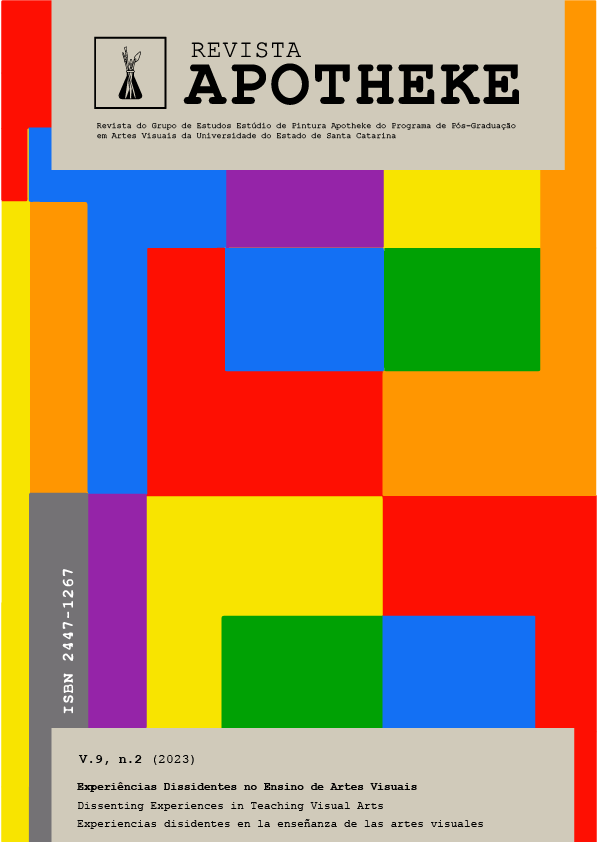Experiência, arte e educação pela perspectiva analítica de Dewey
DOI:
https://doi.org/10.5965/24471267922023152Palavras-chave:
educação, arte, experiência, DeweyResumo
O texto constitui-se por sete partes partindo de uma introdução em que a proposta de caráter bibliográfico é apresentada, se desenvolvendo basicamente pelas referências de John Dewey que tratam do tema envolvendo arte e educação, fundados no conceito de experiência. Após expor algumas informações teórico-biográficas sobre o autor, partimos do problema dos dualismos presentes em nossa cultura, desde os gregos, que acarretou um desmerecimento da experiência em favor da dimensão da teoria, lócus privilegiado da verdade. Nesse sentido, a arte estando no contexto da prática humana se desenvolvia na empiria localizando-se numa dimensão de inferioridade frente às atividades nobres do espírito, cuja contemplação era entendida como a fonte do saber científico verdadeiro. Essa compreensão dos saberes humanos gerou dificuldades que ainda são observadas numa classificação injusta marcadamente elitista e preconceituosa. Tais prejuízos demandam da educação um trabalho formativo urgente para que a profecia de Dewey não se realize, segundo a qual, caso os trabalhadores não se apropriem dos fundamentos das suas atividades, facilmente tornar-se-ão mero apêndices da tecnologia e das máquinas que operam. Pretendendo tornar a filosofia da educação essencialmente acessível e vinculada estreitamente às práticas pedagógicas, Dewey parte da experiência vitalmente associada ao desenvolvimento humano e social, desde que apresente uma qualidade estética que a faz única e seja garantidora do crescimento processual, constante e realmente educativo. Percebemos a importância da arte na educação ao lado da ciência e da filosofia, para o aprimoramento do pensamento cada vez mais avançado para o enfrentamento dos problemas presentes no mundo das experiências.
Downloads
Referências
DEWEY, John. Democracia e educação. 2 a . ed. Trad. Godofredo Range & Anísio Teixeira. São Paulo: Companhia Editora Nacional, 1952.
DEWEY, John. Reconstruction in philosophy. Enlarged edition. Boston: Beacon Press, 1957.
DEWEY, John. Experiência e natureza – Textos selecionados. Trad. Murilo Otávio R. P. Leme. São Paulo: Abril S.A. Cultural e Industrial, 1974.
DEWEY, John. Experiência e educação. 3 a . ed. Trad. Anísio Teixeira. São Paulo: Companhia Editora Nacional, 1979.
DEWEY, John. Cultura e indústria na educação. In: BARBOSA, Ana M. John Dewey e o ensino da arte no Brasil. 3 a . ed. Trad. Ângela Fontes. São Paulo: Editora Cortez, 2001, p. 23-32.
DEWEY, John. A arte como experiência. Trad. Vera Ribeiro. São Paulo: Martins Fontes, 2010.
SOUZA, R. A de; MARTINELI, T. A. P. Considerações históricas sobre a influência de John Dewey no pensamento pedagógico brasileiro. Revista HISTEDBR on-line, Campinas, n. 35, p. 160-162, set. 2009.
Downloads
Publicado
Como Citar
Edição
Seção
Licença
Copyright (c) 2023 Leoni Maria Padilha Henning

Este trabalho está licenciado sob uma licença Creative Commons Attribution-NonCommercial 4.0 International License.
Os autores de trabalhos submetidos à Revista APOTHEKE autorizam sua publicação em meio físico e eletrônico, unicamente para fins acadêmicos, podendo ser reproduzidos desde que citada a fonte. Os mesmos, atestam sua originalidade, autoria e ineditismo.
Os artigos publicados pela revista são de uso gratuito, destinados a aplicações
acadêmicas e não comerciais. Os direitos autorais são todos cedidos à revista. Os artigos cujos autores são identificados representam a expressão do ponto de vista de seus autores e não a posição oficial da Revista Apotheke. O(s) autor(es) se compromete(m) a sempre que publicar material referente ao artigo publicado na Revista Apotheke mencionar a referida publicação da seguinte forma:
"Este artigo foi publicado originalmente pela revista Apotheke em seu volume (colocar o volume), número (colocar o número) no ano de (colocar o ano) e pode ser acessado em: http://www.revistas.udesc.br/index.php/APOTHEKE/index"
É responsabilidade dos autores a obtenção da permissão por escrito para usar em seus artigos materiais protegidos pela Lei de Direitos Autorais. A revista Apotheke não é responsável por quebras de direitos autorais feitas por seus colaboradores.
Os autores mantêm os direitos autorais e concedem à revista o direito de primeira publicação, com o trabalho licenciado sob Licença Creative Commons do tipo atribuição BY-NC:
Atribuição (BY): os licenciados têm o direito de copiar, distribuir, exibir e executar a obra e fazer trabalhos derivados dela, conquanto que deem créditos devidos ao autor ou licenciador, na maneira especificada por estes.
Uso Não comercial (NC): os licenciados podem copiar, distribuir, exibir e executar a obra e fazer trabalhos derivados dela, desde que sejam para fins não comerciais.
Após a publicação dos artigos, os autores permanecem com os direitos autorais e de republicação do texto.




